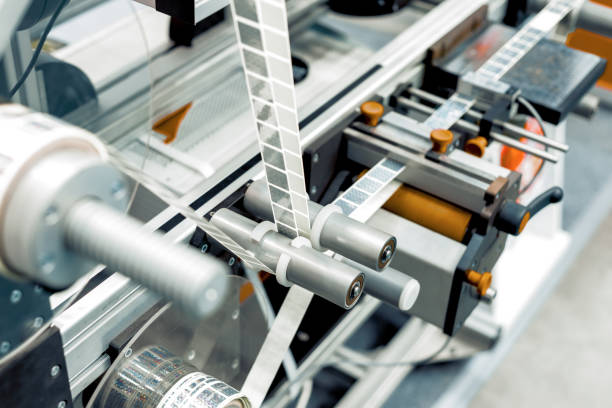How Label Machines Impact Product Branding and Trust from Consumers

Product labeling has shifted from being just a regulatory requisite to a branding and credibility building resource in a business’s branding and manufacturing processes. Trust also comes from the product being labeled accurately, consistently, and aesthetically pleasing. For B2B operations, obtaining an automatic packaging machine with labeling technology worth the ROI in a business’s time, workflow efficiency, error reduction, and production standards.
To end customers, retailers, distributors, and industrial customers, labels are a product’s first impression. For B2B, consistent labeling speaks to reliability and professionalism, while inconsistency and errors show unreliability, and can damage business relationships.
Consistency in the computer labels and in the automatic labeling machine programmable for a packaging machine ensures control over the labeling summary and acts controls over the summary, passes, and marks. The labels are the product and batch and numbers, and to the branding compartment. Automated systems control the labeling to maintain a certain grade. The device also reinforces the communication stream, lowers positional status, and maintains premium elasticity over competition.
In addition, clear, correct labeling shows that a business values quality and the law. For B2B customers, this promise turns into confidence in the supplier, which can influence repeat business and loyalty.
Improved Productivity and Precision with Automated Labeling
In high-volume production, keeping up with manual labeling can be expensive, slow, and prone to mistakes. An automatic packaging machine improves efficiency by labeling packages in a fraction of the time and is less expensive compared to the rest of the workforce, and mistakes become rare. Key benefits include:
- Consistent label placement: Automated systems handle every package the same way, which means there are no misaligned labels and no wasted packaging.
- Speed: Machines can label hundreds or thousands of packages every hour.
- Streamlined operations: Automatic labeling can be coordinated with filling, capping, and sealing, which means all packaging activities are synchronized.
- Guaranteed compliance: Inconsistences caused by people are eliminated, which ensures all labels, designed or controlled, u no… Automated labeling lets companies focus on production efficiency while meeting the remaining quality and compliance requirements. This is important for B2B companies that are small and medium sized and are trying to grow without increasing the amount of manual labor.
Building Consumer Trust through Consistent and Compliant Labeling
Labels must be accurate and precise in order to earn and keep consumer trust. Labels include product specifications, explanatory labels, expiration requirements, ingredient lists, safety notices, and batch numbers. Labeling mistakes can be costly, triggering product recalls, legal action, and the potential loss of a business.
Working with professional label machine manufacturers allows the clients to ensure the business meets industry standards that include ensuring consistent and reliable print clarity. This assists a business to meet the quality and safety standards. Labeling with professionalism and accuracy shows commitment to quality and helps trust and relationships with clients, distributors, and consumers.
Versatility of Label Machines Across Packaging Formats
Modern label machines have the ability to be used with many different packaging formats. This means businesses can efficiently label items that range in many different sizes, shapes, and materials. The ability to adapt an automatic packaging machine to different products is even more critical to businesses that deal with a wide range of items.
- Wrap-around labelers – Great for cylindrical containers like bottles or jars. This type of labeler allows for a 360-degree view of the branding.
- Front-and-back labelers – These labelers stick a label on either side of a product making it possible to provide comprehensive product information.
- Top or bottom labelers: These can be used on flat surfaces, like trays or cartons, and accurately placed at specific locations for consistency.
- Tamper-evident labelling: Show that a product’s packaging has been opened for product safety.
- Flexible labeling systems: These can be quickly adjusted with very few downtimes and can handle a wide range of materials such as glass, plastic, metal and flexible films.
Label machines give businesses the ability to cover a wide range of packaging styles. These devices give companies the ability to streamline their workflows while keeping a uniform branded image. This kind of versatility is vital for B2B manufacturers that cater to different markets or have a wide range of offerings.
Getting the Ideal Label Machine for B2B Needs
The right automatic packaging machines for labeling hinges on understanding the production needs, types of products and the operational framework. B2B operators need to look at the following to companies to ensure that they get a worthwhile investment:
- Production capacity: Machines should be able to cover output needs for the present and the future.
- Labeling precision: Ultimate results come from the combination of high-res printing and accurately placed systems.
- Packaging materials compatibility: Labeling devices should be able to work with varying surfaces and ensure that the labels stick or look neat.
- Easy maintenance: Machines that support quick cleaning and have intuitive systems to control and modular arrangements to maintain will save on downtimes and operating costs.* Integration with Existing Lines: Compatibility with filling, sealing, and capping machinery streamlines processes and reduces the need for manual labor.
- Cost-effectiveness and ROI: Upfront investments in labeling machinery can be offset by lower labor costs, waste reduction, and faster production.
Purchasing the appropriate labeling machinery can help B2B companies boost operational efficiencies, help companies keep their output high-quality, and help companies build reliability for their businesses and distributors.
Long-term benefits of automated labeling systems
Incorporating a label machine in a production line delivers promising long-term benefits, as follows:
- Branding Consistency: Every package will have a label that meets the required specifications, and branding will be consistent for every package, strengthening the company’s identity.
- Regulatory compliance: Precisely readable and clear labels help the organization meet local and international regulations in packaging.
- Operational Efficiency: The automation of processes substantially manual workflows, accelerates production, and reduces the uncontrolled errors that occur in manual labeling.
- Waste Reduction: The automated system reduces the quantity of unused materials which in turn help the organization protect the environment.
- Enhanced client trust: labels that meet specifications on the package help reinforce positive brand association.
Automated labeling drives competitive positioning and provides businesses with the accuracy, speed, and flexibility required for robust client quality assurance.
Integrating Label Machines into Digital and Smart Packaging Solutions
Automatic packaging machines of today feature digital controls that help them integrate into smart production systems. Some of these smart production systems features include:
- Constructing logs for profiling metrics, and for tracking and reporting against production label consumption, and error rates for audits.
- Supervisors performing remote monitoring and real-time troubleshooting on downtime and performance with fast recovery.
- Machines and smart systems collaboration by flexible control to switch from one label size, packaging or design to another.
- Communication with ERP systems for real-time and accurate management of inventories and streamlined operational processes.
Digital systems integration enhances operational control within a business. Improved control and precision quality production provide strong traceability. This enhances control and management quality of production assuring clients and boosting brand reputation.
In conclusion, labeling builds brand recognition and trust especially within B2B markets. This market associates business reliability, quality, and compliance with government control regulatory legislations. Achieving uniform, accurate, and professional labels on products within a line is guaranteed by an automatic packaging machine integrated with smart systems advanced labeling features. This integration of smart systems advanced packaging and labeling features provides scalable, efficient, and dependable labeling developed by reliable label machine manufacturers.
Investing in automation brings a number of benefits for a business. It helps improve production efficiency while keeping a brand identity consistent, lowers mistakes and waste, and helps build strong relationships with customers, distributors, and partners. For the B2B manufacturers we deal with, labeling machines go beyond operational value and improve profitability, position, and brand equity in the highly competitive market of today.



